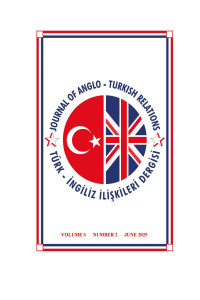Abstract
The aim of this study is to examine the transition of David Harvey one of the leading geographers of our time from the positivist paradigm to the Marxist paradigm through the method of document analysis, and to analyze the factors that played a fundamental role in this transition by investigating Harvey’s paradigmatic shift process. As David Harvey is one of the most prolific and industrious geographers today, the literature includes a significant number of both primary works by Harvey and secondary studies that engage with his scholarship. Therefore, since it is not possible to review and analyze all of these works in detail, this study focuses on key works that reflect Harvey’s paradigmatic transformation. The scope of the study is thus limited not to Harvey’s geographical perspective or his broader body of work, but specifically to those works that illustrate his transition from the positivist paradigm to the Marxist paradigm.
Today recognized as one of the leading figures in Marxist geography, Harvey was, in fact, one of the most ardent proponents of positivist geography during the early years of his academic career. From the early 1960s to the 1970s, over approximately a decade, Harvey produced works grounded in positivist philosophy and directed serious critiques toward the idiographic approach of traditional regional geographers. In 1969, Harvey authored Explanation in Geography, a methodological book in which he offered recommendations for the application of positivist methodology in geography. In this work, he advocated for the use of positivist philosophy in the study of geographical phenomena, aiming to liberate geography from the idiographic approach of traditional regional geography and transform the discipline into a more "scientific" and nomothetic structure.
By the 1970s, after relocating from the United Kingdom to the United States (Baltimore), Harvey was deeply affected by the urban injustices, racism, and uneven spatial development he encountered there, which led him to question the inadequacy of the positivist paradigm in analyzing sociospatial processes. In addition to these experiences, his encounter with a group of Marxist academics and graduate students at his new position at Johns Hopkins University brought about profound transformations in his geographical perspective. During this period, Harvey began reading Marx and, in the following years, produced studies centered on sociospatial processes grounded in Marx’s ideas. In 1973, he consolidated these studies in his work Social Justice and the City, thereby laying the foundations for a sharp turn from positivist geography to Marxist geography.
Keywords
David Harvey Marxist Geography Positivist Geography Paradigm Explanation in Geography Social Justice and City
References
- Peet, R. (1977). The development of radical geography in the United States. Progress in Human Geography, 1(2), (pp. 240-263)
- Sheppard, E., & Barnes, T. J. (2019). Baltimore as truth spot: David Harvey, Johns Hopkins, and urban activism. T. J. Eric Sheppard (Edt.), Spatial Histories of Radical Geography: North America and Beyond (pp. 183-209). Wiley.
Abstract
Bu çalışmanın amacı, doküman analizi yöntemi ile günümüzün önde gelen coğrafyacılarından biri olan David Harvey’in pozitivist paradigmadan Marksist paradigmaya geçişini ele almak ve bu geçişin gerçekleşmesinde etkili olan faktörleri temel düzeyde inceleyerek, Harvey’in paradigmatik değişim sürecini analiz edebilmektir. David Harvey, günümüzün en üretken ve çalışkan coğrafyacılarından biri olduğu için literatürde hem kendisine ait hem de Harvey’in çalışmalarını ele alan çok sayıda ikincil çalışma bulunmaktadır. Bu nedenle, bahse söz konusu bütün eserler incelenip, detaylıca ele alınamayacağı için çalışma, Harvey’in paradigmatik dönüşümünü yansıtan temel eserler üzerinden işlenmeye çalışılmış, çalışmanın kapsamı Harvey’in coğrafi perspektifinden ve çalışmalarından ziyade, pozitivist paradigmadan Marksist paradigmaya geçişini yansıtan çalışmalar ile sınırlandırılmıştır.
Günümüzde, Marksist coğrafyanın önde gelen isimlerinden biri olarak bilinen Harvey, aslında akademik kariyerinin ilk yıllarında pozitivist coğrafyanın en ateşli savunucularından biri olmuştur. Harvey, 1960’lı yılların başlarından 1970’li yıllara kadar kabaca on yıllık bir zaman diliminde pozitivist felsefeye dair çalışmalara imza atmış, geleneksel bölgesel coğrafyacıların idiografik yaklaşımına ciddi eleştirilerde bulunmuştur. 1969 yılında, coğrafyada pozitivist metodolojinin kullanımına yönelik önerilerde bulunduğu bir yöntem kitabı olan Explanation in Geography eserini kaleme alan Harvey, bu eserinde, coğrafi fenomenlerin incelenmesi için pozitivist felsefeyi önermiş, böylece coğrafyayı geleneksel bölgesel coğrafyanın idiografik yaklaşımından kurtarıp, disiplini, daha “bilimsel” ve nomotetik bir yapıya büründürmeyi hedeflemiştir.
1970’li yıllara gelindiğinde, İngiltere’den ABD’ye (Baltimore) taşınan Harvey, burada karşılaştığı kentsel adaletsizlik, ırkçılık, eşitsiz mekânsal gelişim gibi unsurlardan oldukça etkilenmiş ve pozitivist paradigmanın sosyomekansal süreçlerin incelenmesi konusundaki yetersizliğini sorgulamaya başlamıştır. Tüm bunlara ek olarak, yeni atandığı Johns Hopkins Üniversitesi’nden bir grup Marksist akademisyen ve lisansüstü öğrenci ile de tanışınca coğrafi perspektifinde köklü değişimler meydana gelmiştir. Harvey, bu yıllarda Marx’la ilgili okumalar yapmaya başlamış ve daha sonraki süreçte Marx’ın fikirlerini temel alarak sosyomekansal süreçleri odak noktasına alan çalışmalar üretmeye başlamıştır. 1973 yılında, bu çalışmalarını Sosyal Adalet ve Şehir isimli eserinde toplamış ve böylece pozitivist coğrafyadan Marksist coğrafyaya doğru keskin bir dönüşün temellerini atmıştır.
Keywords
David Harvey Marksist Coğrafya Pozitivist Coğrafya Paradigma Explanation in Geography Social Justice and City
References
- Peet, R. (1977). The development of radical geography in the United States. Progress in Human Geography, 1(2), (pp. 240-263)
- Sheppard, E., & Barnes, T. J. (2019). Baltimore as truth spot: David Harvey, Johns Hopkins, and urban activism. T. J. Eric Sheppard (Edt.), Spatial Histories of Radical Geography: North America and Beyond (pp. 183-209). Wiley.
Details
| Primary Language | English |
|---|---|
| Subjects | Historical Studies (Other) |
| Journal Section | Research Articles |
| Authors | |
| Publication Date | June 14, 2025 |
| Submission Date | May 16, 2025 |
| Acceptance Date | May 29, 2025 |
| Published in Issue | Year 2025 Volume: 6 Issue: 2 |
Journal of Anglo Turkish Relations © 2025 by Behçet Kemal Yesilbursa is licensed under CC BY-NC-SA 4.0


